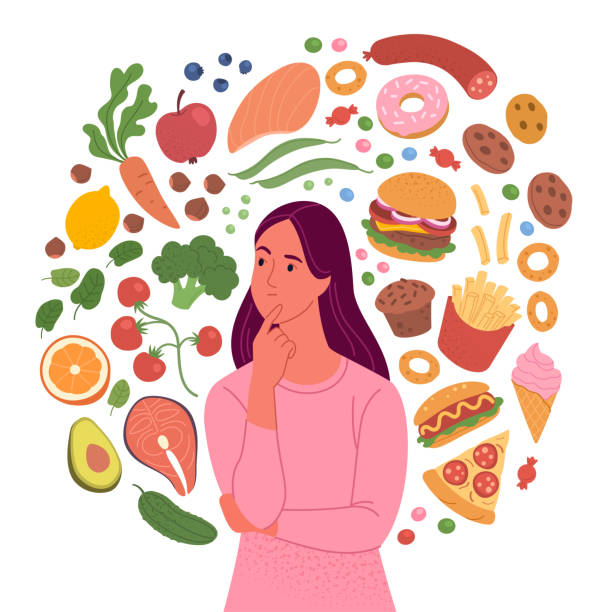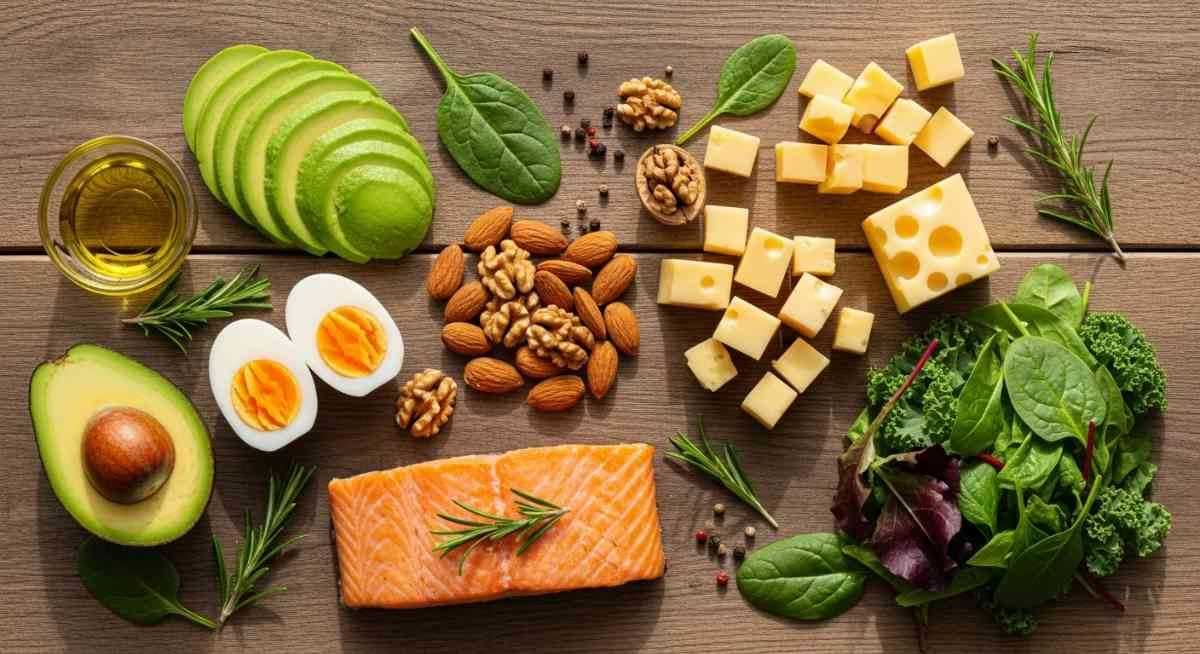What is Healthy Food?
Healthy food is food that provides the body with the nutrients it needs to function properly. Nutrients are substances that the body needs to grow, develop, and stay healthy. They include vitamins, minerals, carbohydrates, protein, and fat.
Healthy food is important for overall health and well-being. It can help to prevent chronic diseases such as heart disease, stroke, cancer, and diabetes. It can also help to improve mood, energy levels, and sleep quality.
What are the Benefits of Eating Healthy?
There are many benefits to eating healthy. Some of the benefits include:
- Reduced risk of chronic diseases: Eating healthy can help to reduce the risk of chronic diseases such as heart disease, stroke, cancer, and diabetes.
- Improved mood: Eating healthy can help to improve mood and reduce stress levels.
- Increased energy levels: Eating healthy can help to increase energy levels and improve overall stamina.
- Better sleep: Eating healthy can help to improve sleep quality and reduce the risk of insomnia.
- Healthy weight: Eating healthy can help to maintain a healthy weight and reduce the risk of obesity.
- Stronger immune system: Eating healthy can help to strengthen the immune system and fight off infection.
- Increased lifespan: Eating healthy can help to increase lifespan and reduce the risk of premature death.
Here are some specific examples of how eating healthy can benefit your health:
- Eating fruits and vegetables can help to reduce the risk of heart disease, stroke, and some types of cancer. Fruits and vegetables are low in calories and fat and high in fiber, vitamins, and minerals. They also contain antioxidants, which can help to protect cells from damage.
- Eating whole grains can help to reduce the risk of heart disease, stroke, and type 2 diabetes. Whole grains are a good source of fiber, which can help to lower cholesterol and improve blood sugar control.
- Eating lean protein can help to build and repair muscle tissue. Lean protein sources include chicken, fish, tofu, and beans. They are low in fat and calories and high in protein.
- Limiting unhealthy fats can help to reduce the risk of heart disease, stroke, and some types of cancer. Unhealthy fats are found in processed foods, fried foods, and fatty meats. They can increase the risk of heart disease and other health problems.
- Limiting sugar can help to reduce the risk of tooth decay and weight gain. Sugar is found in many processed foods and drinks. It can contribute to tooth decay and weight gain.
- Drinking plenty of water can help to keep the body hydrated and can help to improve digestion. Water is essential for good health. It helps to keep the body hydrated and can help to improve digestion.
Some Healthy Foods to Eat?
| Food Group | Examples | Benefits |
|---|---|---|
Fruits |
Apples, bananas, berries, grapes, oranges, peaches, pears, pineapples, strawberries, watermelon | Good source of vitamins, minerals, and fiber |
Vegetables |
Artichokes, asparagus, broccoli, Brussels sprouts, cabbage, carrots, celery, corn, cucumbers, eggplant, green beans, lettuce, mushrooms, onions, peppers, potatoes, spinach, tomatoes, zucchini | Good source of vitamins, minerals, and fiber |
Whole grains |
Brown rice, bulgur wheat, oatmeal, quinoa, wild rice | Good source of fiber, vitamins, and minerals |
Lean protein |
Chicken, fish, lean beef, lentils, tofu, beans | Good source of protein without a lot of fat |
Healthy fats |
Avocados, nuts, seeds, olive oil | Good source of healthy fats, fiber, and protein |
Water |
Water | Essential for good health and can help you stay hydrated |
Dairy |
Low-fat or fat-free milk, yogurt, cheese, eggs | Good source of calcium, protein, and other nutrients |
Legumes |
Lentils, beans, peas | Good source of protein, fiber, and other nutrients |
Nuts and seeds |
Almonds, peanuts, walnuts, seeds | Good source of healthy fats, fiber, and protein |
Healthy oils |
Olive oil, canola oil, avocado oil | Good source of healthy fats |
Herbs and spices |
Garlic, onion, ginger, turmeric, rosemary | Add flavor to food and can have health benefits |
Other healthy foods |
Dark chocolate, tea, coffee | Can be enjoyed in moderation as part of a healthy diet |
Eat healthy 🥑🥕🍌🍎 for better health 💪💯
Here is a list of healthy foods to eat, in more detail:

Fruits
- Apples are a good source of fiber, vitamin C, and potassium. They are also a good source of antioxidants, which can help protect your cells from damage.
- Bananas are a good source of potassium, vitamin B6, and magnesium. They are also a good source of energy, making them a good choice for breakfast or a snack.
- Berries are a good source of antioxidants, fiber, and vitamin C. They are also a good source of anthocyanins, which are plant compounds that have been shown to have health benefits, such as reducing inflammation and improving heart health.
- Grapes are a good source of potassium, vitamin K, and resveratrol. Resveratrol is a plant compound that has been shown to have health benefits, such as reducing inflammation and improving heart health.
- Oranges are a good source of vitamin C, potassium, and fiber. They are also a good source of antioxidants, which can help protect your cells from damage.
- Peaches are a good source of vitamin C, potassium, and fiber. They are also a good source of antioxidants, which can help protect your cells from damage.
- Pears are a good source of fiber, vitamin C, and potassium. They are also a good source of antioxidants, which can help protect your cells from damage.
- Pineapples are a good source of vitamin C, manganese, and thiamin. They are also a good source of bromelain, an enzyme that has been shown to have health benefits, such as reducing inflammation and improving digestion.
- Strawberries are a good source of vitamin C, fiber, and potassium. They are also a good source of antioxidants, which can help protect your cells from damage.
- Watermelon is a good source of vitamin C, lycopene, and potassium. Lycopene is a plant compound that has been shown to have health benefits, such as reducing the risk of cancer and heart disease.
Vegetables
-
- Broccoli is a good source of vitamin C, vitamin K, and fiber. It is also a good source of sulforaphane, an antioxidant that has been shown to have health benefits, such as reducing the risk of cancer.
- Carrots are a good source of vitamin A, vitamin K, and fiber. They are also a good source of beta-carotene, an antioxidant that has been shown to have health benefits, such as reducing the risk of cancer.
- Celery is a good source of vitamin K, fiber, and potassium. It is also a good source of antioxidants, which can help protect your cells from damage.
- Cucumbers are a good source of vitamin K, fiber, and potassium. They are also a good source of antioxidants, which can help protect your cells from damage.
- Eggplant is a good source of vitamin C, potassium, and fiber. It is also a good source of nasunin, an antioxidant that has been shown to have health benefits, such as reducing inflammation and improving heart health.
- Green beans are a good source of vitamin K, fiber, and potassium. They are also a good source of antioxidants, which can help protect your cells from damage.
- Lettuce is a good source of vitamin K, fiber, and potassium. It is also a good source of antioxidants, which can help protect your cells from damage.
- Mushrooms are a good source of vitamin D, potassium, and fiber. They are also a good source of antioxidants, which can help protect your cells from damage.
- Onions are a good source of vitamin C, vitamin K, and fiber. They are also a good source of quercetin, an antioxidant that has been shown to have health benefits, such as reducing inflammation and improving heart health.
- Peppers are a good source of vitamin C, vitamin A, and fiber. They are also a good source of capsaicin, a compound that has been shown to have health benefits, such as reducing inflammation and improving heart health.
- Potatoes are a good source of vitamin C, potassium, and fiber. They are also a good source of antioxidants, which can help protect your cells from damage.
- Spinach is a good source of vitamin K, vitamin A, and fiber. It is also a good source of lutein and zeaxanthin, antioxidants that have been shown to have health benefits, such as reducing the risk of macular degeneration and cataracts.
- Tomatoes are a good source of vitamin C, vitamin A, and potassium. They are also a good source of lycopene, an antioxidant that has been shown to have health benefits
Whole grains
- Brown rice is a good source of fiber, magnesium, and selenium. It is also a good source of complex carbohydrates, which provide sustained energy.
- Bulgur wheat is a good source of fiber, iron, and magnesium. It is also a good source of complex carbohydrates, which provide sustained energy.
- Oatmeal is a good source of fiber, manganese, and vitamin B1. It is also a good source of complex carbohydrates, which provide sustained energy.
- Quinoa is a good source of fiber, protein, and iron. It is also a good source of complex carbohydrates, which provide sustained energy.
- Wild rice is a good source of fiber, manganese, and magnesium. It is also a good source of complex carbohydrates, which provide sustained energy.
Lean protein
- Chicken is a good source of protein, niacin, and selenium. It is also a good source of iron, which is important for carrying oxygen in the blood.
- Fish is a good source of protein, omega-3 fatty acids, and selenium. It is also a good source of vitamin D, which is important for bone health.
- Tofu is a good source of protein, iron, and calcium. It is also a good source of fiber, which can help you feel full and satisfied after eating.
- Beans are a good source of protein, fiber, and iron. They are also a good source of magnesium, which is important for muscle and nerve function.
- Lentils are a good source of protein, fiber, and iron. They are also a good source of folate, which is important for pregnant women.
Healthy fats
- Avocados are a good source of healthy fats, fiber, and potassium. They are also a good source of vitamin C, which is important for the immune system.
- Nuts are a good source of healthy fats, fiber, and protein. They are also a good source of vitamins and minerals, such as vitamin E, magnesium, and potassium.
- Seeds are a good source of healthy fats, fiber, and protein. They are also a good source of vitamins and minerals, such as vitamin E, magnesium, and zinc.
Water
Water is essential for good health. It helps to regulate body temperature, flush toxins, and keep the body hydrated. It is important to drink plenty of water throughout the day.
Nuts and seeds
Nuts and seeds are a great source of healthy fats, fiber, and protein. They are also a good source of vitamins and minerals, such as vitamin E, magnesium, and potassium.
- Almonds are a good source of vitamin E, magnesium, and fiber. They are also a good source of protein.
- Peanuts are a good source of protein, fiber, and magnesium. They are also a good source of vitamin E.
- Walnuts are a good source of omega-3 fatty acids, vitamin E, and fiber. They are also a good source of protein.
- Seeds (such as chia seeds, flaxseeds, and pumpkin seeds) are a good source of fiber, magnesium, and omega-3 fatty acids. They are also a good source of protein.
Nuts and seeds can be eaten on their own, added to foods, or used to make healthy snacks and meals. They are a great way to add nutrients and flavor to your diet.
Healthy oils
Healthy oils are a good source of unsaturated fats, which are essential for good health. They are also a good source of vitamin E.
- Olive oil is a good source of monounsaturated fatty acids, which are beneficial for heart health. It is also a good source of vitamin E.
- Canola oil is a good source of polyunsaturated fatty acids, which are also beneficial for heart health. It is also a good source of vitamin E.
- Avocado oil is a good source of monounsaturated fatty acids and vitamin E. It is also a good source of oleic acid, which is a type of fat that has been shown to have health benefits, such as reducing the risk of heart disease.
Healthy oils can be used for cooking, salad dressings, and other purposes. They are a great way to add healthy fats and flavor to your diet.
Herbs and spices
Herbs and spices add flavor to food and can have health benefits. Some herbs and spices that have been shown to have health benefits include:
- Garlic has been shown to have anti-inflammatory and antioxidant properties. It has also been shown to reduce the risk of heart disease and cancer.
- Onion has been shown to have anti-inflammatory and antioxidant properties. It has also been shown to reduce the risk of heart disease and cancer.
- Ginger has been shown to have anti-inflammatory and antioxidant properties. It has also been shown to reduce nausea and vomiting.
- Turmeric has been shown to have anti-inflammatory and antioxidant properties. It has also been shown to reduce the risk of Alzheimer’s disease and cancer.
- Rosemary has been shown to have anti-inflammatory and antioxidant properties. It has also been shown to improve cognitive function.
Herbs and spices can be added to food while cooking or sprinkled on top of food after it is cooked. They are a great way to add flavor and health benefits to your diet.
Other healthy foods
Some other healthy foods that can be enjoyed in moderation as part of a healthy diet include:
-
- Dark chocolate is a good source of antioxidants and can have health benefits, such as reducing the risk of heart disease and stroke. It is important to choose dark chocolate that contains at least 70% cocoa.
- Tea is a good source of antioxidants and can have health benefits, such as reducing the risk of cancer and heart disease. Some types of tea, such as green tea and black tea, also contain caffeine, which can help improve cognitive function.
- Coffee is a good source of antioxidants and can have health benefits, such as reducing the risk of cancer and heart disease. Coffee also contains caffeine, which can help improve cognitive function.
Healthy Food Choices
- Read food labels carefully: When reading food labels, look for the following information:
- Calories: Calories are a measure of energy. It is important to be aware of the number of calories you are consuming each day.
- Fat: Fat is an important nutrient, but it is also high in calories. It is important to choose foods that are low in unhealthy fats, such as saturated and trans fats.
- Sodium: Sodium is a mineral that can contribute to high blood pressure. It is important to limit your intake of sodium.
- Fiber: Fiber is an important nutrient that can help you feel full and satisfied after eating. It is important to choose foods that are high in fiber.
- Nutrients: Look for foods that are high in vitamins and minerals. These nutrients are essential for good health.
Healthy Food Choices
Cook at home: Cooking at home gives you more control over the ingredients that go into your food. This makes it easier to make healthy choices. When cooking at home, try to use fresh ingredients and avoid processed foods.
Plan your meals: Planning your meals ahead of time can help you make healthy choices. This way, you are less likely to reach for unhealthy snacks or meals when you are hungry. When planning your meals, try to include a variety of healthy foods from all food groups.
Make healthy snacks available: Having healthy snacks available can help you avoid unhealthy choices. Some healthy snacks include fruits, vegetables, nuts, and yogurt.
Eat slowly and savor your food: Eating slowly and savoring your food can help you eat less and enjoy your food more. When you eat slowly, you give your body time to register that you are full.
Listen to your body: Pay attention to your body and stop eating when you are full. This will help you avoid overeating.
Here are some examples of healthy food choices:
Breakfast:
- Oatmeal with fruit and nuts
- Yogurt with fruit and granola
- Whole-wheat toast with avocad
Lunch:
- Salad with grilled chicken or fish
- Soup and salad
- Sandwich on whole-wheat bread with lean protein, vegetables, and a healthy spread
Dinner:
- Grilled chicken or fish with roasted vegetables
- Whole-wheat pasta with tomato sauce and vegetables
- Lentil soup
Snacks:
-
- Fruits
- Vegetables
- Nuts
- Yogurt
Here are some tips on how to make healthy food choices when eating out:
-
- Look for restaurants that offer healthy options. Many restaurants now offer healthy options, such as grilled chicken or fish, steamed vegetables, and whole grains.
- Ask for substitutions. If you don’t see a healthy option on the menu, ask if you can make substitutions, such as asking for a grilled chicken sandwich instead of a fried chicken sandwich, or asking for a side of vegetables instead of french fries.
- Order in moderation. When ordering food, be mindful of the portion size. It is better to order less food and ask for a to-go box than to order too much food and waste it.
- Enjoy your meal! Eating healthy doesn’t have to be boring. There are many delicious and healthy foods out there. So relax, enjoy your meal, and savor the flavors.
Eating Healthy: It’s Not Just About What You Eat
Eating healthy is often thought of as simply eating a diet that is low in calories, fat, and sugar. While these are important factors, there is more to eating healthy than just what you eat.

The way you eat is just as important as what you eat. Eating slowly and savoring your food can help you eat less and enjoy your food more. It can also help you to be more mindful of what you are eating and to make healthier choices.
Eating in a relaxed and enjoyable environment can also help you to eat healthier. When you are stressed or rushed, you are more likely to make unhealthy choices.
Finally, it is important to remember that eating healthy is a lifestyle choice. It is not something that you do for a short period of time and then go back to your old habits. By making healthy choices and eating in a healthy way, you can improve your overall health and well-being for the long term.
Healthy eating: the key to a happy life 🔑 😊 🍎
Here are some tips for eating healthy in a relaxed and enjoyable way:
-
- Eat at the table. Eating at the table can help you to be more mindful of what you are eating and to avoid distractions.
- Turn off the TV. Watching TV while you eat can lead to overeating and unhealthy choices.
- Eat with friends and family. Eating with others can make mealtimes more enjoyable and help you to eat slower.
- Create a relaxing atmosphere. Play soft music, light candles, and set the table with nice dishes and silverware.
- Make healthy food choices. Choose foods that you enjoy and that are good for you.
- Listen to your body. Stop eating when you are full.
- Don’t be afraid to experiment. There are many different healthy foods out there. Don’t be afraid to try new things
Making Healthy Food Choices is big Challenge
Making healthy food choices can be a challenge for many people. There are many factors that can make it difficult to eat healthy, including:
-
Making healthy food choices - Time constraints: Many people are busy and don’t have time to cook healthy meals.
- Cost: Healthy foods can be more expensive than unhealthy foods.
- Lack of knowledge: Some people may not know how to make healthy food choices.
- Taste preferences: Some people may not like the taste of healthy foods.
- Stress: Stress can lead to unhealthy eating habits.
Despite these challenges, there are many things that people can do to make healthy food choices. Here are a few tips:
- Plan ahead: Make a plan for your meals and snacks ahead of time. This will help you avoid making unhealthy choices when you’re hungry.
- Cook at home: Cooking at home gives you more control over the ingredients in your food.
- Read food labels: When you’re shopping for food, read the food labels carefully. This will help you make informed choices about what to buy.
- Make small changes: Don’t try to change your entire diet overnight. Start by making small changes, such as adding more fruits and vegetables to your meals.
- Find healthy recipes: There are many healthy recipes available online and in cookbooks. Find recipes that you enjoy and that fit your budget.
- Don’t be afraid to ask for help: If you’re struggling to make healthy food choices, talk to your doctor or a registered dietitian. They can help you create a plan that’s right for you.
if you’re ready to start making healthy food choices, here are a few things you can do today:
-
- Plan your meals for the week.
- Go grocery shopping and stock up on healthy foods.
- Cook a healthy meal tonight.
- Make a small change to your diet, such as adding more fruits or vegetables.
- Find a healthy recipe that you enjoy.
- Talk to your doctor or a registered dietitian for help.
Healthy food choices: hard but worth it 💪 🍎 🥒 🥕 🥗 🏃♀️
Healthy Eating for Different Stages of Life
Healthy eating is important for people of all ages and stages of life. The foods you eat can have a big impact on your health, and making healthy choices can help you stay strong and healthy throughout your life.
Here provides some general guidelines for healthy eating at different stages of life. It is important to talk to your doctor or a registered dietitian to get personalized advice for your individual needs.
Healthy eating for all stages of life 🍎 🥕 🥗 🏃♀️ 👶 👦 👧 👨 👩 👴 👵
Pregnancy
- Eat a balanced diet that includes plenty of fruits, vegetables, and whole grains.
- Get enough iron and calcium.
- Avoid processed foods, sugary drinks, and excessive amounts of caffeine.
- Stay hydrated by drinking plenty of water.
Breast feeding

- Continue to eat a healthy diet that includes plenty of fruits, vegetables, and whole grains.
- Get enough iron and calcium.
- Drink plenty of water.
- If you are taking a prenatal vitamin, continue to take it after your baby is born.
Infants and toddlers
- Breast milk or formula is the best food for infants.
- Start introducing solid foods to your baby around 6 months of age.
- Offer a variety of healthy foods to your baby.
- Avoid giving your baby sugary drinks or foods.
- Limit the amount of salt and fat in your baby’s diet.
Children and adolescents

- Encourage children to eat a variety of healthy foods.
- Limit sugary drinks and processed foods.
- Make sure children get enough physical activity.
Adults
- Eat a balanced diet that includes plenty of fruits, vegetables, and whole grains.
- Get enough protein, calcium, and iron.
- Limit unhealthy fats, sugar, and sodium.
- Stay hydrated by drinking plenty of water.
Older adults
- Eat a healthy diet that includes plenty of fruits, vegetables, and whole grains.
- Get enough protein, calcium, and vitamin D.
- Limit unhealthy fats, sugar, and sodium.
- Stay hydrated by drinking plenty of water.
- Make sure to get regular exercise.
People with special conditions
If you have a special condition, such as diabetes, heart disease, or obesity, you may need to follow a special diet. It is important to talk to your doctor or a registered dietitian about the best way to eat for your health.
Healthy Eating for Weight Loss

If you are trying to lose weight, it is important to make healthy food choices. This means eating plenty of fruits, vegetables, and whole grains. It also means limiting processed foods, sugary drinks, and unhealthy fats.
There are many different ways to lose weight. The best way for you will depend on your individual needs and goals. However, making healthy food choices is an important part of any weight loss plan.
🏃♀️🏋️♂️🚴♂️ Lose weight and improve your health with healthy eating.
Food Group |
Healthy Choices |
Unhealthy Choices |
|---|---|---|
| Fruits | Fresh, frozen, or canned fruits without added sugar | Dried fruits with added sugar |
| Vegetables | Fresh, frozen, or canned vegetables without added salt or fat | Vegetables with added sauces or dressings |
| Whole grains | Whole-wheat bread, pasta, rice, cereal, and tortillas | White bread, pasta, rice, cereal, and tortillas |
| Lean protein | Chicken, fish, beans, lentils, tofu, and nuts | Red meat, processed meats, and high-fat dairy products |
| Healthy fats | Unsaturated fats from nuts, seeds, avocados, and olive oil | Saturated and trans fats from animal products, processed foods, and fried foods |
| Sugary drinks | Water, unsweetened tea, and coffee | Soda, juice, and sports drinks |
Healthy eating is important for weight loss and overall health!
-
- Eat plenty of fruits 🍎🍊🍋🍌🍉🍇🍓🍑🍒🍈🍍🥥🥝🫐 and vegetables 🥦🥒🌶️🫑🍆🥑🧄🧅.
- Choose lean protein sources 🍗🐟🥚🍳.
- Limit unhealthy fats 🧈🧀.
- Stay hydrated 💧.
- Make healthy eating a part of your lifestyle 🍽️🥣🧋 and lose weight for good! 💪❤️
Eating healthy is essential for good health. It can help you maintain a healthy weight, reduce your risk of chronic diseases, and improve your overall mood and energy levels.
Making healthy food choices is a journey, not a destination. By following the tips above, you can make healthy eating a part of your lifestyle and improve your overall health.








